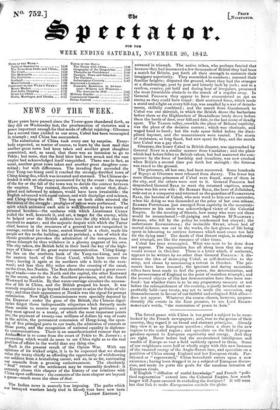NEWS OF THE WEEK.
MANY years have passed since the Tower-guns thundered forth, as they did on Wednesday last, the proclamation of victories and a
peace important enough for that mode of official rejoicing : Ghuznee has a second time yielded to our arms, Cabul has been reoccupied in triumph ; and China has succumbed. The submission of China took every one by surprise. Every- body expected, as matter of course, to learn by the next mail that
another great town had been taken and another great slaughter committed, and, as usual, that there was an intention to go to Pekin ; but none, that the fatal blow had been struck and the vast empire had acknowledged itself vanquished. There was in fact, as usual, another great town taken and another great slaughter corn- nutted; but with differences. The invading fleet ascended the river Yang-tse-kiang until it reached the strongly-fortified town of Ching-kiang-foo, which was invested and stormed. The Chinese de- fended it with an obstinacy accounted for by the event : the repulse of the foe or the fall of the town was to decide the contest between the empires. They resisted, therefore, with a valour that, disci- plined and informed by science, would have been irresistible : the English advanced with equal valour, and with discipline and science, and Ching-kiang-foo fell. The loss on both side's attested the fierceness of the struggle : prodigies of valour were performed. The spirit which animated each side is well illustrated by two traits of personal heroism—the coolness with which Lieutenant CUDDY scaled the wall, bestrode it, and sat, a target for the enemy, while he helped over the British soldiers into the city which they had resolved to master ; and the majestic despair with which the Tartar chief, beaten in the resources of a general but not vanquished in courage, retired to his home, seated himself in a chair, made his people set fire to the building, and so perished ; a fate of which the classic grandeur provokes the admiration of the conqueror, from whose triumph he thus withdrew in a gloomy pageant of his own. The city taken, the British held in their hand the key of the high- ways of China—of its great water-communication. Ching-kiang- foe lies on the southern bank of the Yang-tse-kiang, and on the eastern bank of the Great Canal, which here enters the liver ; leaving it again at its northern side a little to the west- ward; and leas than fifty miles above the crossing of the canal, on the river, lies Nankin. The fleet therefore occupied a great cross- ing of roads—one to the North and the capital, the other Eastward to the ocean, another to the Southern provinces, and the fourth Westward to-Nankin. By that water-carriage circulate the necessa- ries of life in China, and the British grasped its heart. It was scarcely requisite to go beyond that except to seize the fruits of vic- tory; and thus their appearance at Nankin was the signal for prompt submission. New High Commissioners were specially deputed by the Emperor : under the guns of the British, the Chinese digni- taries forgot those indispensable etiquettes which formerly made them unable to receive any communications but petitions ; and they soon agreed to a treaty, of which the most important points are, the payment of twenty-one millions of dollars by way of costs in the action, the permanent concession of Hong-kong, the open- ing of five principal ports to our trade, the admission of consuls at those ports, and the recognition of national equality in diploma- tic communications There is an unauthenticated rumour that an Ambastellor is to come from the court of Pekin to St. James's ; a Proceeding which would do more to set China right as to the real Position of affairs in the world than any thing else. Such is the present result of the Opium War. With our opinions of its wicked origin, it is to be expected that we should value the treaty chiefly as affording the opportunity of withdrawing our soldiers from a brutalizing career, and as, in so far, extricating our councils from a growing embarrassment. The absolutely 'final" nature of the settlement may be reasonably doubted: it certainly closes this chapter of the history of our relations with China upon sufferance : the contents of the next chapter are beyond a guess--much more the close of that.


























